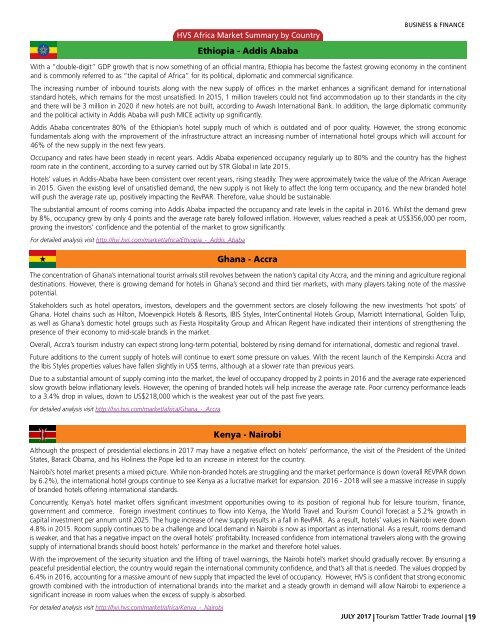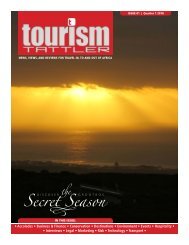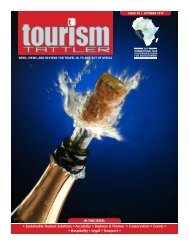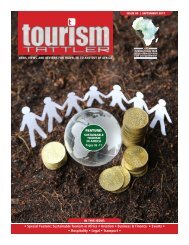Tourism Tattler July 2017
You also want an ePaper? Increase the reach of your titles
YUMPU automatically turns print PDFs into web optimized ePapers that Google loves.
HVS Africa Market Summary by Country<br />
Ethiopia - Addis Ababa<br />
BUSINESS & FINANCE<br />
With a “double-digit” GDP growth that is now something of an official mantra, Ethiopia has become the fastest growing economy in the continent<br />
and is commonly referred to as “the capital of Africa” for its political, diplomatic and commercial significance.<br />
The increasing number of inbound tourists along with the new supply of offices in the market enhances a significant demand for international<br />
standard hotels, which remains for the most unsatisfied. In 2015, 1 million travelers could not find accommodation up to their standards in the city<br />
and there will be 3 million in 2020 if new hotels are not built, according to Awash International Bank. In addition, the large diplomatic community<br />
and the political activity in Addis Ababa will push MICE activity up significantly.<br />
Addis Ababa concentrates 80% of the Ethiopian’s hotel supply much of which is outdated and of poor quality. However, the strong economic<br />
fundamentals along with the improvement of the infrastructure attract an increasing number of international hotel groups which will account for<br />
46% of the new supply in the next few years.<br />
Occupancy and rates have been steady in recent years. Addis Ababa experienced occupancy regularly up to 80% and the country has the highest<br />
room rate in the continent, according to a survey carried out by STR Global in late 2015.<br />
Hotels’ values in Addis-Ababa have been consistent over recent years, rising steadily. They were approximately twice the value of the African Average<br />
in 2015. Given the existing level of unsatisfied demand, the new supply is not likely to affect the long term occupancy, and the new branded hotel<br />
will push the average rate up, positively impacting the RevPAR. Therefore, value should be sustainable.<br />
The substantial amount of rooms coming into Addis Ababa impacted the occupancy and rate levels in the capital in 2016. Whilst the demand grew<br />
by 8%, occupancy grew by only 4 points and the average rate barely followed inflation. However, values reached a peak at US$356,000 per room,<br />
proving the investors’ confidence and the potential of the market to grow significantly.<br />
For detailed analysis visit http://hvi.hvs.com/market/africa/Ethiopia_-_Addis_Ababa<br />
The concentration of Ghana’s international tourist arrivals still revolves between the nation’s capital city Accra, and the mining and agriculture regional<br />
destinations. However, there is growing demand for hotels in Ghana’s second and third tier markets, with many players taking note of the massive<br />
potential.<br />
Stakeholders such as hotel operators, investors, developers and the government sectors are closely following the new investments ‘hot spots’ of<br />
Ghana. Hotel chains such as Hilton, Moevenpick Hotels & Resorts, IBIS Styles, InterContinental Hotels Group, Marriott International, Golden Tulip,<br />
as well as Ghana’s domestic hotel groups such as Fiesta Hospitality Group and African Regent have indicated their intentions of strengthening the<br />
presence of their economy to mid-scale brands in the market.<br />
Overall, Accra’s tourism industry can expect strong long-term potential, bolstered by rising demand for international, domestic and regional travel.<br />
Future additions to the current supply of hotels will continue to exert some pressure on values. With the recent launch of the Kempinski Accra and<br />
the Ibis Styles properties values have fallen slightly in US$ terms, although at a slower rate than previous years.<br />
Due to a substantial amount of supply coming into the market, the level of occupancy dropped by 2 points in 2016 and the average rate experienced<br />
slow growth below inflationary levels. However, the opening of branded hotels will help increase the average rate. Poor currency performance leads<br />
to a 3.4% drop in values, down to US$218,000 which is the weakest year out of the past five years.<br />
For detailed analysis visit http://hvi.hvs.com/market/africa/Ghana_-_Accra<br />
Ghana - Accra<br />
Although the prospect of presidential elections in <strong>2017</strong> may have a negative effect on hotels’ performance, the visit of the President of the United<br />
States, Barack Obama, and his Holiness the Pope led to an increase in interest for the country.<br />
Nairobi’s hotel market presents a mixed picture. While non-branded hotels are struggling and the market performance is down (overall REVPAR down<br />
by 6.2%), the international hotel groups continue to see Kenya as a lucrative market for expansion. 2016 - 2018 will see a massive increase in supply<br />
of branded hotels offering international standards.<br />
Concurrently, Kenya’s hotel market offers significant investment opportunities owing to its position of regional hub for leisure tourism, finance,<br />
government and commerce. Foreign investment continues to flow into Kenya, the World Travel and <strong>Tourism</strong> Council forecast a 5.2% growth in<br />
capital investment per annum until 2025. The huge increase of new supply results in a fall in RevPAR. As a result, hotels’ values in Nairobi were down<br />
4.8% in 2015. Room supply continues to be a challenge and local demand in Nairobi is now as important as international. As a result, rooms demand<br />
is weaker, and that has a negative impact on the overall hotels’ profitability. Increased confidence from international travelers along with the growing<br />
supply of international brands should boost hotels’ performance in the market and therefore hotel values.<br />
With the improvement of the security situation and the lifting of travel warnings, the Nairobi hotel’s market should gradually recover. By ensuring a<br />
peaceful presidential election, the country would regain the international community confidence, and that’s all that is needed. The values dropped by<br />
6.4% in 2016, accounting for a massive amount of new supply that impacted the level of occupancy. However, HVS is confident that strong economic<br />
growth combined with the introduction of international brands into the market and a steady growth in demand will allow Nairobi to experience a<br />
significant increase in room values when the excess of supply is absorbed.<br />
For detailed analysis visit http://hvi.hvs.com/market/africa/Kenya_-_Nairobi<br />
Kenya - Nairobi<br />
JULY <strong>2017</strong> <strong>Tourism</strong> <strong>Tattler</strong> Trade Journal 19

















